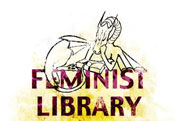Feminist Library
 |
|
| Country | England |
|---|---|
| Type | Special library |
| Established | 1975 |
| Location | London |
| Coordinates | 51°29′55″N 0°06′20″W / 51.4985°N 0.1055°WCoordinates: 51°29′55″N 0°06′20″W / 51.4985°N 0.1055°W |
| Collection | |
| Items collected | Books, Periodicals, Pamphlets |
| Size | Approx. 14,700 |
| Website | Feminist Library |
The Feminist Library was founded as the Women’s Research and Resources Centre in 1975 by a group of women concerned about the future of the Fawcett Library to ensure that the history of the women's liberation movement survived. The founders included feminist academics like Diana Leonard and Leonore Davidoff.
The library started out as a small collection of contemporary material, but is now considered to be most significant library of feminist material in England, containing some 7500 books, of which around 5000 are non-fiction, 500 poetry publications, and 1500 periodical titles, many self-published, spanning over about 85 metres of shelving. There is also a large number of pamphlets, currently held at the Bishopsgate Institute.
The library faced a financial crisis in 2003 when Lambeth Council dramatically increased the rent on the building housing the collections.
Four years later, in 2007, the management committee called an emergency meeting as a final attempt to gather support. Fortunately, the meeting was well attended and the library was saved, although it still struggles today, depending on grants to survive. Opening hours have increased in 2013 - 2014 but are still dependent on the availability of volunteers.
In January 2010, the library announced that it had received a grant from Awards for All, which it intended to use to train volunteers in radical librarianship, using the library itself as a resource. In March 2010, fifteen volunteers were chosen from many applicants and they began working at the library in April 2010. One of the trainees is writing an anonymous blog about her experiences.
The amount of poetry and fiction in the library is unusual for a special collection focused on a political movement. The reason for this is that the library wanted to ensure individual women were represented as part of their liberation, as explained by Gail Chester, a member of the library's management committee, in an interview with Anne Welsh in 2007.
...
Wikipedia
